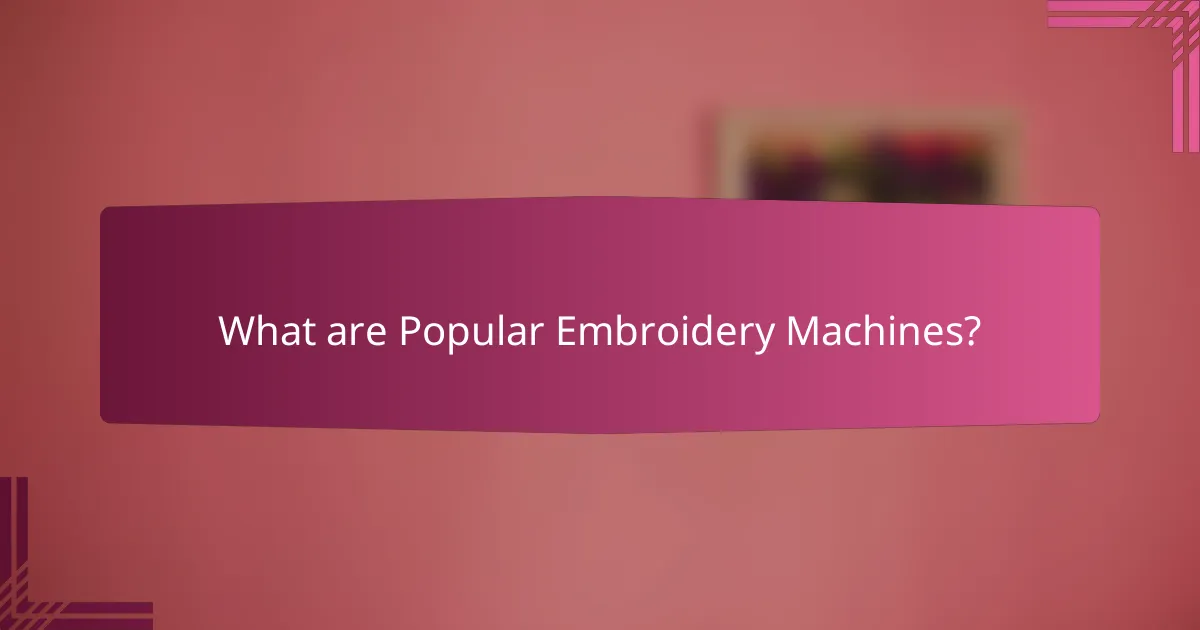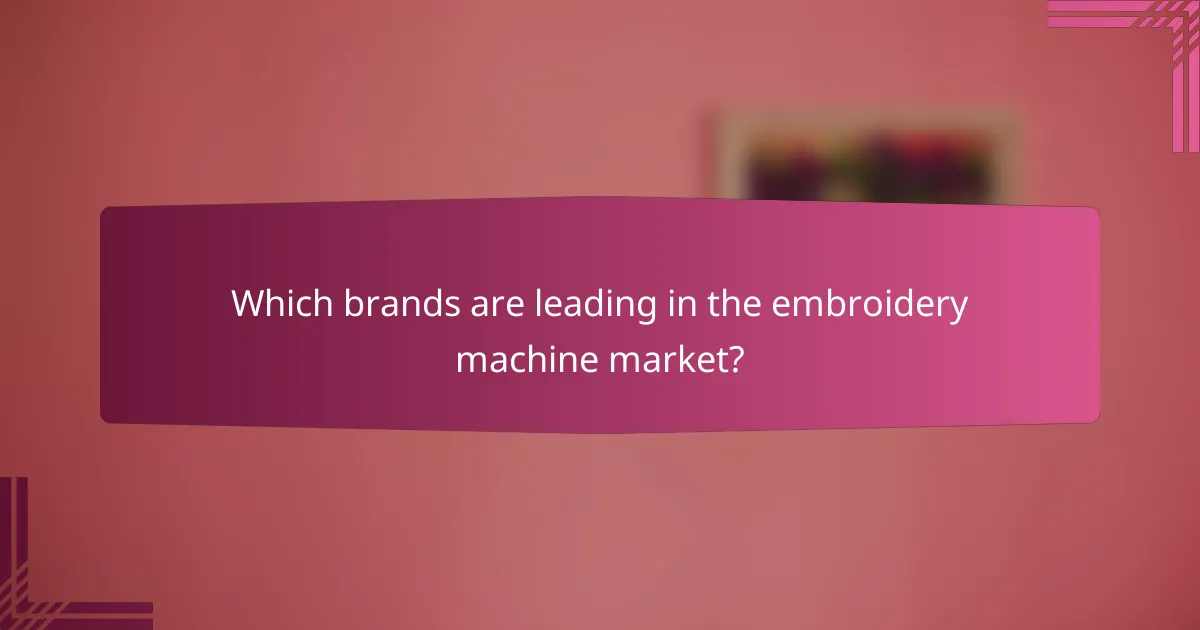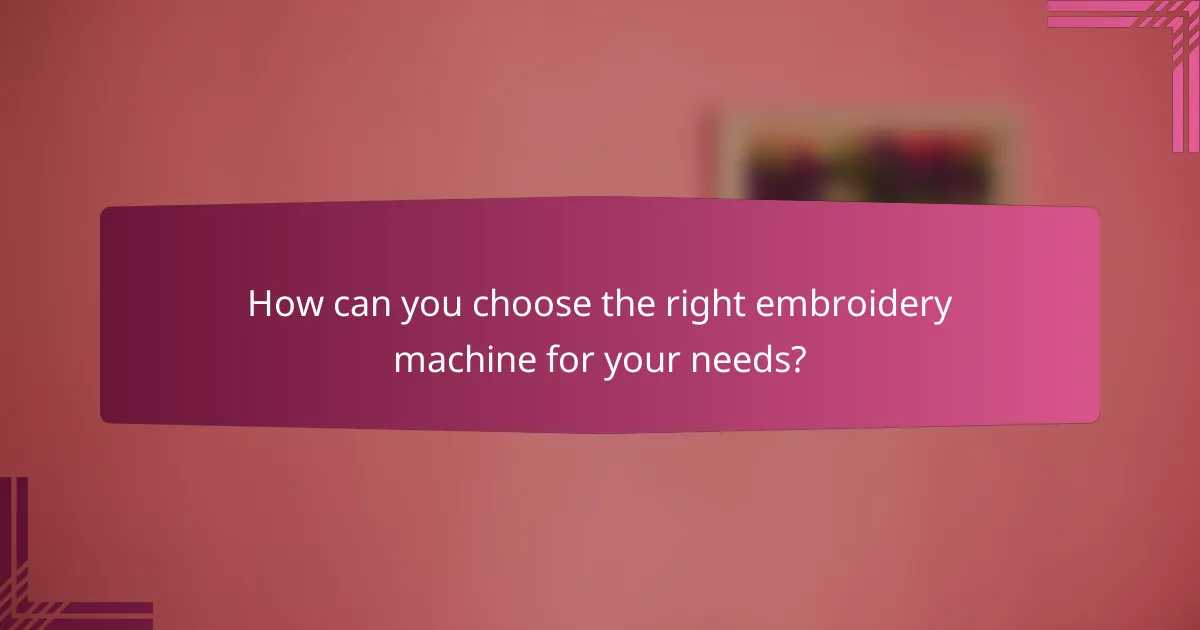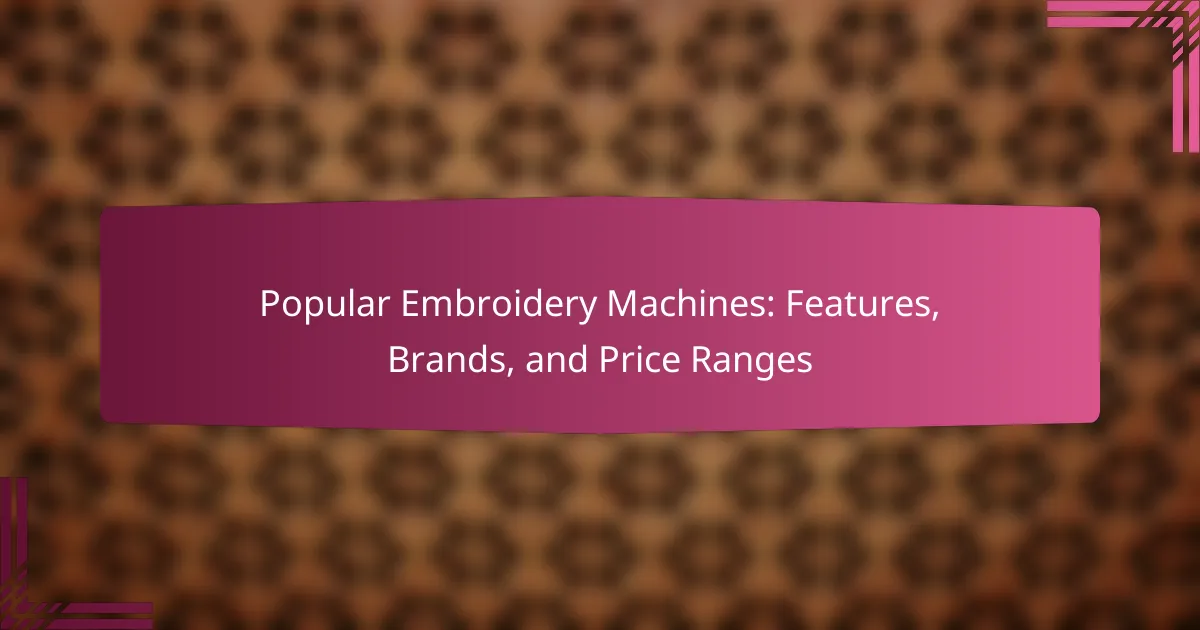
What are Popular Embroidery Machines?
Popular embroidery machines are specialized devices designed for stitching decorative patterns on fabric. They range from basic models for beginners to advanced machines for professionals. Common brands include Brother, Janome, and Bernina. These machines often feature built-in designs, USB connectivity, and adjustable stitch settings. Prices vary significantly, starting from around $200 for entry-level models to over $10,000 for high-end options. The popularity of these machines is attributed to their ease of use and versatility in various sewing projects.
How do Popular Embroidery Machines differ from traditional sewing machines?
Popular embroidery machines differ from traditional sewing machines primarily in their functionality. Embroidery machines are specifically designed for creating intricate designs and patterns. They utilize computerized technology to automate stitching, allowing for a wide range of designs. Traditional sewing machines focus on basic stitching tasks, such as sewing seams and hems.
Embroidery machines often have built-in designs and the ability to import custom designs via USB. Traditional machines typically do not have these features. Additionally, embroidery machines have a larger embroidery area, accommodating bigger designs. Traditional sewing machines usually have a smaller work area.
Moreover, embroidery machines can handle multiple thread colors more efficiently. This capability is limited in traditional sewing machines. The price range also varies, with embroidery machines generally being more expensive due to their advanced features.
What specific features set embroidery machines apart?
Embroidery machines are distinguished by features such as stitch quality, speed, and design capabilities. High stitch quality ensures precise and clean embroidery results. Speed is measured in stitches per minute, with many machines reaching up to 1,000 stitches per minute. Design capabilities include built-in designs and the ability to import custom designs via USB. Some machines offer multi-needle functionality, allowing for faster color changes. Additionally, user-friendly interfaces and touchscreen controls enhance ease of use. These features collectively contribute to the efficiency and versatility of embroidery machines in various projects.
How does the technology in embroidery machines enhance sewing capabilities?
Technology in embroidery machines enhances sewing capabilities by automating intricate designs and increasing precision. Advanced features include built-in designs, which allow users to select patterns easily. Many machines offer digitizing software, enabling customization of designs. The incorporation of LCD screens simplifies navigation and design adjustments. Additionally, multi-needle systems facilitate faster production by allowing color changes without manual intervention. Some models provide wireless connectivity for easy design transfer from computers. The use of high-speed stitching technology significantly reduces production time. Overall, these technological advancements make embroidery more accessible and efficient for users.
What are the key features of popular embroidery machines?
Popular embroidery machines typically feature automatic threading, built-in designs, and adjustable stitch speeds. Automatic threading simplifies setup, making it user-friendly. Built-in designs offer a variety of patterns for creative projects. Adjustable stitch speeds allow for customization based on fabric type and project complexity. Many models also include a large embroidery area, accommodating larger designs. USB connectivity is common, enabling easy transfer of designs from a computer. LCD touch screens enhance user interaction and navigation through settings. Some machines offer multi-needle options, allowing for simultaneous color changes, which increases efficiency.
What types of embroidery designs can be created with these machines?
Embroidery machines can create a variety of designs including monograms, logos, and intricate patterns. They are capable of producing decorative stitches, appliqué designs, and custom artwork. Additionally, these machines can handle multi-color designs and complex motifs. Some advanced models enable 3D embroidery and free-motion stitching. The ability to digitize images allows for unique, personalized creations. These features make embroidery machines versatile for both hobbyists and professionals.
How do built-in designs and editing functions improve user experience?
Built-in designs and editing functions enhance user experience by providing convenience and creativity. Users can access a variety of pre-installed designs, eliminating the need for external software. This feature saves time and simplifies the embroidery process. Editing functions allow customization of designs, such as resizing and color changes. This flexibility caters to individual preferences and project requirements. Research indicates that user-friendly interfaces significantly increase satisfaction levels among crafters. A study by the Craft & Hobby Association found that 78% of users prefer machines with built-in editing capabilities for improved creativity.
What are the typical price ranges for popular embroidery machines?
Typical price ranges for popular embroidery machines vary significantly. Entry-level machines generally cost between $200 and $600. Mid-range models typically range from $600 to $1,500. High-end machines can exceed $1,500 and go up to $10,000 or more. These price differences reflect features, capabilities, and brand reputation. For example, Brother and Janome offer reliable machines at lower price points. In contrast, brands like Bernina and Pfaff are known for premium options. Overall, the price depends on the machine’s complexity, stitch quality, and additional features.
How do price ranges vary among different brands and models?
Price ranges for embroidery machines vary significantly among different brands and models. For instance, entry-level machines from brands like Brother can range from $200 to $600. Mid-range models, such as those from Janome, typically cost between $600 and $1,200. High-end machines from brands like Bernina can exceed $5,000. Features like stitch count, hoop size, and built-in designs influence these price differences. Additionally, brand reputation and warranty offerings can also affect pricing. Overall, consumers can expect a wide range of prices depending on their specific requirements and brand preferences.
What factors influence the cost of embroidery machines?
The cost of embroidery machines is influenced by several key factors. Firstly, the machine’s brand plays a significant role. Well-known brands often command higher prices due to their reputation and reliability. Secondly, the machine’s features impact its cost. Machines with advanced technology, such as automatic threading and multi-needle capabilities, tend to be more expensive.
Additionally, the size of the embroidery machine affects its price. Larger machines that can handle bigger projects usually cost more than smaller models. The type of machine also matters. Commercial-grade machines are typically pricier than home-use models due to their durability and performance.
Moreover, the included accessories can influence the overall cost. Machines that come with a variety of hoops, threads, and software may be priced higher. Lastly, market demand and availability can affect pricing trends. High demand for specific models can lead to increased prices.

Which brands are leading in the embroidery machine market?
Brother, Janome, and Bernina are leading brands in the embroidery machine market. Brother is known for its user-friendly models and innovative technology. Janome offers high-quality machines that cater to both beginners and professionals. Bernina is recognized for its premium build quality and advanced features. These brands consistently receive positive reviews for performance and reliability. According to industry reports, they dominate market share due to their diverse product ranges.
What are the most reputable brands for embroidery machines?
Brother, Janome, Bernina, and Husqvarna Viking are the most reputable brands for embroidery machines. Brother is known for its user-friendly models and extensive features. Janome offers durable machines with innovative technology. Bernina is recognized for high-quality craftsmanship and precision stitching. Husqvarna Viking provides advanced embroidery features and a strong support network. These brands consistently receive positive reviews for reliability and performance. Their products cater to both beginners and advanced users, ensuring a wide range of options.
What unique features do brands like Brother and Janome offer?
Brother and Janome offer unique features that enhance user experience in embroidery. Brother machines often include built-in tutorials and a wide range of embroidery designs. Their models are known for easy connectivity options, such as USB ports and wireless capabilities. Janome, on the other hand, is recognized for its superior stitch quality and robust build. They provide unique features like the AcuFeed Flex system for even feeding of fabric layers. Both brands emphasize user-friendly interfaces, making them accessible for beginners. Additionally, Janome offers exclusive features like the automatic needle threader and a larger embroidery area in certain models. These distinctive attributes cater to diverse sewing needs and preferences.
How do brand reputations impact consumer choice in embroidery machines?
Brand reputations significantly influence consumer choice in embroidery machines. A strong brand reputation often correlates with perceived quality and reliability. Consumers tend to trust brands with positive feedback and established histories. Research shows that 70% of buyers are influenced by brand reputation when making purchasing decisions. High-reputation brands often command higher prices due to consumer trust. Conversely, brands with negative reputations may struggle to attract customers, regardless of product features. Brand loyalty can lead to repeat purchases among satisfied consumers. Overall, brand reputation serves as a crucial factor in the competitive embroidery machine market.
What customer reviews say about popular embroidery brands?
Customer reviews indicate that popular embroidery brands like Brother and Janome are well-regarded for their reliability and user-friendly features. Many users praise Brother machines for their extensive built-in designs and ease of use. Janome is frequently highlighted for its durability and high-quality stitching.
Consumers often mention that Bernina machines offer exceptional precision, although they tend to be pricier. Reviews also note that Singer machines are popular among beginners for their affordability and straightforward operation.
Overall, customer feedback emphasizes the importance of features like stitch quality, ease of threading, and customer support, which vary across brands. Users appreciate brands that provide comprehensive manuals and responsive customer service.
What common praises or complaints do users have about specific brands?
Users commonly praise brands like Brother for their ease of use and reliable performance. Many users appreciate the extensive features and versatility offered by these machines. Complaints often arise regarding the durability of certain models, with some users reporting issues with parts wearing out quickly. Janome receives positive feedback for its stitch quality and user-friendly interface. However, users have noted that customer support can be lacking. Bernina is lauded for its high-quality build and advanced technology. Nonetheless, some users find the price point to be a significant drawback. Overall, user experiences vary widely across brands, highlighting both strengths and weaknesses.
How do customer experiences shape brand loyalty in the embroidery machine market?
Customer experiences significantly shape brand loyalty in the embroidery machine market. Positive interactions with the product enhance satisfaction. Satisfied customers are more likely to recommend the brand to others. This word-of-mouth marketing is crucial in niche markets like embroidery machines. Consistent quality and reliable customer service reinforce trust in the brand. According to a study by Bain & Company, increasing customer retention by just 5% can boost profits by 25% to 95%. Thus, exceptional customer experiences lead to repeat purchases and long-term loyalty in the embroidery machine sector.

How can you choose the right embroidery machine for your needs?
To choose the right embroidery machine for your needs, assess your skill level and intended use. Beginners may prefer user-friendly models with basic features. Advanced users might require machines with complex capabilities. Consider the types of projects you plan to undertake. Some machines cater to small designs, while others handle larger projects. Evaluate the machine’s stitch quality and speed. Higher stitch-per-minute rates improve efficiency. Check for built-in designs and editing features. Machines with diverse designs offer more creative options. Investigate the brand’s reputation and customer support. Reliable brands often provide better service and warranty options. Lastly, compare price ranges to find a machine that fits your budget. A well-matched machine enhances your embroidery experience.
What factors should be considered when selecting an embroidery machine?
When selecting an embroidery machine, consider the machine’s features, capabilities, and price. Key features include stitch quality, hoop size, and built-in designs. The machine should accommodate various fabric types and thicknesses. Look for user-friendly interfaces and software compatibility for design editing. Check the machine’s speed and efficiency for productivity. Warranty and customer support are also important for maintenance needs. Research customer reviews to gauge reliability and performance. Finally, compare prices across brands to find the best value for your needs.
How do your sewing skills and project types influence your choice?
Sewing skills and project types significantly influence the choice of embroidery machines. Advanced skills often lead to selecting machines with more features and capabilities. Beginners may prefer simpler models that are user-friendly. Project types, such as quilting or garment making, dictate the necessary machine functions. For example, a quilter may need a machine with a larger throat space. Conversely, someone focused on small projects may choose a compact model. The complexity of the intended projects also affects the choice of stitch options required. Additionally, budget constraints can limit choices based on skill level and project demands. Ultimately, aligning machine features with skills and project types ensures optimal results.
What are the essential features to look for based on your budget?
When selecting an embroidery machine based on budget, essential features include stitch quality, hoop size, and built-in designs. Stitch quality determines the precision and appearance of finished projects. A larger hoop size allows for bigger designs and more versatility. Built-in designs offer immediate options without needing additional purchases. Additionally, consider ease of use, including user interface and threading mechanisms. These features directly impact the user experience and project outcomes. Research indicates that machines priced between $300 and $600 often provide a balance of quality and functionality for hobbyists.
What are some tips for maintaining your embroidery machine?
Regularly clean your embroidery machine to prevent dust buildup. Use a soft brush to remove lint and debris from the needle area and bobbin case. Change the needle frequently to ensure clean stitching. Lubricate the machine according to the manufacturer’s guidelines to keep it running smoothly. Check the tension settings regularly to avoid thread breakage. Store the machine in a dust-free environment when not in use. Perform regular software updates to ensure optimal performance. Finally, consult the user manual for specific maintenance instructions tailored to your model.
How can regular maintenance extend the life of your embroidery machine?
Regular maintenance can significantly extend the life of your embroidery machine. Routine cleaning prevents dust and debris buildup, which can hinder performance. Lubrication of moving parts reduces friction and wear. Regularly checking and replacing needles ensures optimal stitching quality. Calibration of the machine maintains precise tension and alignment. Following the manufacturer’s maintenance schedule can prevent costly repairs. Studies show that machines with consistent upkeep last longer and perform better. Proper maintenance can add years to the machine’s lifespan, enhancing productivity and efficiency.
What common troubleshooting tips can help resolve issues with embroidery machines?
Check the thread tension. Incorrect tension can cause thread breakage or uneven stitching. Ensure the needle is appropriate for the fabric type. Using the wrong needle can lead to skipped stitches. Clean the machine regularly to remove lint and debris. A clean machine operates more efficiently. Verify that the embroidery design is compatible with the machine. Incompatible designs can result in errors during stitching. Update the machine’s firmware if available. Firmware updates can fix bugs and improve performance. Finally, consult the user manual for specific troubleshooting steps. Manuals often provide solutions tailored to particular models.
Popular embroidery machines are specialized devices designed for stitching intricate patterns on fabric, available in a range of models from beginner to professional levels. Key features include built-in designs, USB connectivity, adjustable stitch settings, and varying price points from $200 to over $10,000. The article explores the differences between embroidery machines and traditional sewing machines, highlights the leading brands such as Brother, Janome, and Bernina, and discusses essential features, price ranges, and factors influencing costs. Additionally, it addresses user experiences, maintenance tips, and troubleshooting advice to help consumers select the right machine for their needs.
